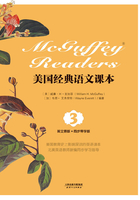
LESSON 14
THE LITTLE BIRD'S SONG
WORD LIST
melody unnoticed modest content Gracie
1. A little bird, with feathers brown,
Sat singing on a tree;
The song was very soft and low,
But sweet as it could be.
2. The people who were passing by,
Looked up to see the bird
That made the sweetest melody
That ever they had heard.

3. But all the bright eyes looked in vain;
Birdie was very small,
And with his modest, dark-brown coat,
He made no show at all.
4. “Why, father, ” little Gracie said,
“Where can the birdie be?
If I could sing a song like that,
I'd sit where folks could see.”
5. “I hope my little girl will learn
A lesson from the bird,
And try to do what good she can,
Not to be seen or heard.”
6. “This birdie is content to sit
Unnoticed on the way,
And sweetly sing his Maker's praise
From dawn to close of day.”
7. “So live, my child, all through your life,
That, be it short or long,
Though others may forget your looks,
They'll not forget your song.”
STUDY GUIDE
A. Comprehension Questions—Talk about these questions.
1. Why couldn't the people see the bird?
2. What lesson does the father hope his daughter learns from the bird?
3. Why is your “song” more important than your “looks” ?
4. A melody is a song. Do you like the melody that birds make? Why or why not?
5. Can you sing very well? Do you like other people to watch you sing?
B. Make Questions—Make questions to ask the bird. Use the question words. An example has been done for you.
1. What do you like to eat?
2. Why ________________________________________?
3. Where _______________________________________?
4. Who ________________________________________?
5. When ________________________________________?
6. How ________________________________________?
C. Who did it or said it? Look back at the poem and tell who did or said each thing. Choose from the following:
Gracie father the bird people
1. ________sang a sweet song.
2. ________looked for the bird.
3. ________asked where the bird was.
4. ________was dark brown.
5. ________said looks are not as important as your song.
6. ________was very small.